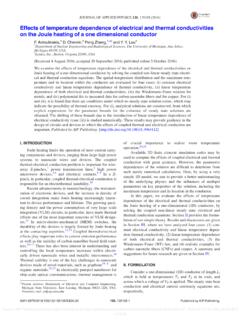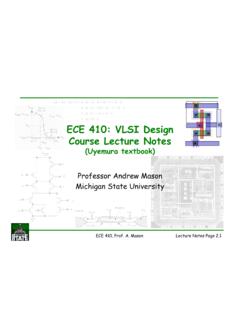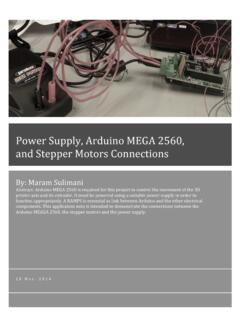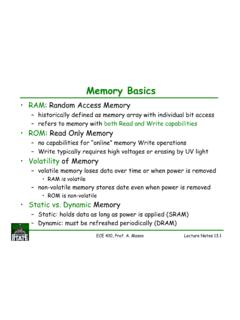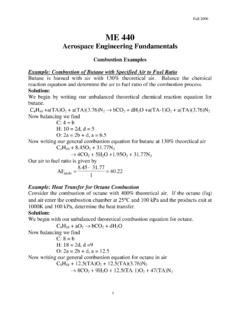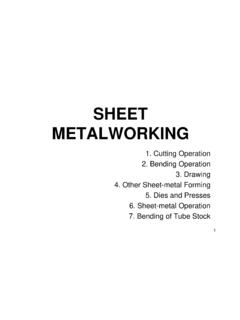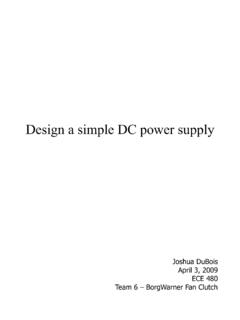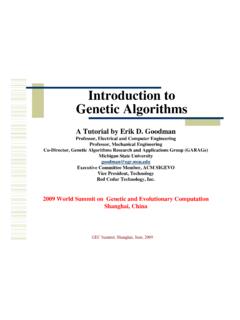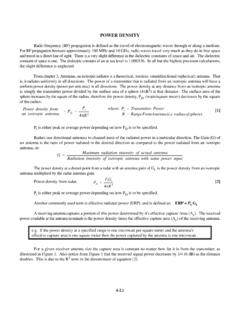Transcription of Chapter 2. Design of Beams – Flexure and Shear
1 CE 405: Design of Steel Structures Prof. Dr. A. Varma Chapter 2. Design of Beams Flexure and Shear Section force-deformation response & Plastic Moment (Mp). A beam is a structural member that is subjected primarily to transverse loads and negligible axial loads. The transverse loads cause internal Shear forces and bending moments in the Beams as shown in Figure 1 below. w P. x V(x). M(x). Figure 1. Internal Shear force and bending moment diagrams for transversely loaded Beams . These internal Shear forces and bending moments cause longitudinal axial stresses and Shear stresses in the cross-section as shown in the Figure 2 below. dF = b dy d y M(x). V(x).. b +d / 2 +d / 2. Curvature = = 2 /d F = b dy M = b dy y (Planes remain plane). d / 2 d / 2. Figure 2. Longitudinal axial stresses caused by internal bending moment. 1. CE 405: Design of Steel Structures Prof. Dr. A.
2 Varma Steel material follows a typical stress-strain behavior as shown in Figure 3 below. u y . y u Figure 3. Typical steel stress-strain behavior. If the steel stress-strain curve is approximated as a bilinear elasto-plastic curve with yield stress equal to y, then the section Moment - Curvature (M- ) response for monotonically increasing moment is given by Figure 4. Mp B C D E. My A. y y y y y Section Moment, M. y y y y y y 2 y 5 y 10 y y 2 y 5 y 10 y A B C D E. Curvature, . A: Extreme fiber reaches y B: Extreme fiber reaches 2 y C: Extreme fiber reaches 5 y D: Extreme fiber reaches 10 y E: Extreme fiber reaches infinite strain Figure 4. Section Moment - Curvature (M- ) behavior. 2. CE 405: Design of Steel Structures Prof. Dr. A. Varma In Figure 4, My is the moment corresponding to first yield and Mp is the plastic moment capacity of the cross-section. - The ratio of Mp to My is called as the shape factor f for the section.
3 - For a rectangular section, f is equal to For a wide-flange section, f is equal to Calculation of Mp: Cross-section subjected to either + y or - y at the plastic limit. See Figure 5 below. y A1 y1 y A 1. Plastic centroid. A2 y2. y A 2. y (a) General cross-section (b) Stress distribution (c) Force distribution F = y A1 y A 2 = 0. A1 = A 2 = A / 2. A. M = y ( y1 + y 2 ). 2. Where , y1 = centroid of A1. y 2 = centroid of A 2. (d) Equations Figure 5. Plastic centroid and Mp for general cross-section. The plastic centroid for a general cross-section corresponds to the axis about which the total area is equally divided, , A1 = A2 = A/2. - The plastic centroid is not the same as the elastic centroid or center of gravity ( ) of the cross-section. 3. CE 405: Design of Steel Structures Prof. Dr. A. Varma - As shown below, the is defined as the axis about which A1y1 = A2y2. y1 A1, y1.
4 = elastic A , y About the A 1 y 1 = A 2 y2. y2. 2 2. For a cross-section with at-least one axis of symmetry, the neutral axis corresponds to the centroidal axis in the elastic range. However, at Mp, the neutral axis will correspond to the plastic centroidal axis. For a doubly symmetric cross-section, the elastic and the plastic centroid lie at the same point. Mp = y x A/2 x (y1+y2). As shown in Figure 5, y1 and y2 are the distance from the plastic centroid to the centroid of area A1 and A2, respectively. A/2 x (y1+y2) is called Z, the plastic section modulus of the cross-section. Values for Z are tabulated for various cross-sections in the properties section of the LRFD manual. Mp = Z Fy - See Spec. where, Mp = plastic moment, which must be My for homogenous cross-sections My = moment corresponding to onset of yielding at the extreme fiber from an elastic stress distribution = Fy S for homogenous cross-sections and = Fyf S for hybrid sections.
5 Z = plastic section modulus from the Properties section of the AISC manual. S = elastic section modulus, also from the Properties section of the AISC manual. 4. CE 405: Design of Steel Structures Prof. Dr. A. Varma Example Determine the elastic section modulus, S, plastic section modulus, Z, yield moment, My, and the plastic moment Mp, of the cross-section shown below. What is the Design moment for the beam cross-section. Assume 50 ksi steel. 12 in. F1 in. W t = in. 16 in. w F2 in. 15 in. Ag = 12 x + (16 - - ) x + 15 x = in2. Af1 = 12 x = 9 in2. Af2 = 15 x = in2. Aw = x (16 - - ) = in2. distance of elastic centroid from bottom = y 9 (16 / 2) + + 15 y= = in. Ix = 12 + + + + 13/12 +. 15 = 1430 in4. Sx = Ix / ( ) = in3. My-x = Fy Sx = kip-in. = kip-ft. distance of plastic centroid from bottom = y p + ( y p ) = = 2. y p = in. 5. CE 405: Design of Steel Structures Prof.
6 Dr. A. Varma 9 + y1=centroid of top half-area about plastic centroid = = in. + y2=centroid of bottom half-area about plas. cent. = = in. Zx = A/2 x (y1 + y2) = x ( + ) = in3. Mp-x = Zx Fy = x 50 = kip-in. = kip-ft. Design strength according to AISC Spec. bMp= x = kip-ft. Check = Mp My Therefore, kip-ft. < x = kip-ft. - OK! Reading Assignment 6. CE 405: Design of Steel Structures Prof. Dr. A. Varma Flexural Deflection of Beams Serviceability Steel Beams are designed for the factored Design loads. The moment capacity, , the factored moment strength ( bMn) should be greater than the moment (Mu) caused by the factored loads. A serviceable structure is one that performs satisfactorily, not causing discomfort or perceptions of unsafety for the occupants or users of the structure. - For a beam, being serviceable usually means that the deformations, primarily the vertical slag, or deflection, must be limited.
7 - The maximum deflection of the designed beam is checked at the service-level loads. The deflection due to service-level loads must be less than the specified values. The AISC Specification gives little guidance other than a statement in Chapter L, Serviceability Design Considerations, that deflections should be checked. Appropriate limits for deflection can be found from the governing building code for the region. The following values of deflection are typical maximum allowable total (service dead load plus service live load) deflections. Plastered floor construction L/360. Unplastered floor construction L/240. Unplastered roof construction L/180. In the following examples, we will assume that local buckling and lateral-torsional buckling are not controlling limit states, , the beam section is compact and laterally supported along the length. 7. CE 405: Design of Steel Structures Prof.
8 Dr. A. Varma Example Design a simply supported beam subjected to uniformly distributed dead load of 450 lbs/ft. and a uniformly distributed live load of 550 lbs/ft. The dead load does not include the self-weight of the beam. Step I. Calculate the factored Design loads (without self-weight). wU = wD + wL = kips / ft. MU = wu L2 / 8 = x 302 / 8 = kip-ft. Step II. Select the lightest section from the AISC Manual Design tables. From page of the AISC manual, select W16 x 26 made from 50 ksi steel with bMp = kip-ft. Step III. Add self-weight of designed section and check Design wsw = 26 lbs/ft Therefore, wD = 476 lbs/ft = lbs/ft. wu = x + x = kips/ft. Therefore, Mu = x 302 / 8 = kip-ft. < bMp of W16 x 26. OK! Step IV. Check deflection at service loads. w = + + kips/ft. = kips/ft. = 5 w L4 / (384 E Ix) = 5 x ( ) x (30 x 12)4 / (384 x 29000 x 301). = in. > L/360 - for plastered floor construction Step V.
9 Redesign with service-load deflection as Design criteria L /360 = in. > 5 w L4/(384 E Ix). Therefore, Ix > in4. 8. CE 405: Design of Steel Structures Prof. Dr. A. Varma Select the section from the moment of inertia selection tables in the AISC manual. See page select W21 x 44. W21 x 44 with Ix = 843 in4 and bMp = 358 kip-ft. (50 ksi steel). Deflection at service load = = in. < L/360 - OK! Note that the serviceability Design criteria controlled the Design and the section Example Design the beam shown below. The unfactored dead and live loads are shown in the Figure. 10 kips (live load). k/ft. (dead load). k/ft. (live load). 15 ft. 30 ft. Step I. Calculate the factored Design loads (without self-weight). wu = wD + wL = x + x = kips / ft. Pu = PD + PL = x 0 + x 10 = kips Mu = wU L2 / 8 + PU L / 4 = + 120 = kip-ft. Step II. Select the lightest section from the AISC Manual Design tables.
10 From page _____ of the AISC manual, select W21 x 44 made from 50 ksi steel with bMp = kip-ft. Self-weight = wsw = 44 lb/ft. 9. CE 405: Design of Steel Structures Prof. Dr. A. Varma Step III. Add self-weight of designed section and check Design wD = + = kips/ft wu = x + x = kips/ft. Therefore, Mu = x 302 / 8 + 120 = kip-ft. < bMp of W21 x 44. OK! Step IV. Check deflection at service loads. Service loads Distributed load = w = + = kips/ft. Concentrated load = P = D + L = 0 + 10 kips = 10 kips Deflection due to uniform distributed load = d = 5 w L4 / (384 EI). Deflection due to concentrated load = c = P L3 / (48 EI). Therefore, service-load deflection = = d + c = 5 x x 3604 / (384 x 29000 x 12 x 843) + 10 x 3603 / (48 x 29000 x 843). = + = in. Assuming unplastered floor construction, max = L/240 = 360/240 = in. Therefore, < max - OK! 10. CE 405: Design of Steel Structures Prof.

